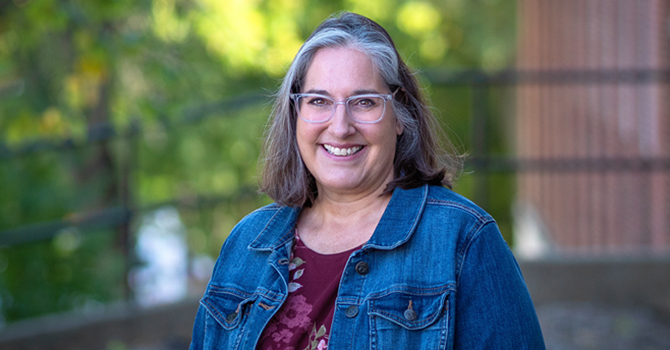You Belong Here: Creating an Environment Where Everyone Thrives

Jackie Cormany
Graduate Program Coordinator, Health Behavior and Health Education
Public health isn't just one thing—it really is everything! Everything around us relates to public health in one way or another. When young people in high school and undergraduate studies see how their interests relate to population-level health, it draws them in.
From there, we need to reassure them that their journey matters to Michigan Public Health, no matter what their background or backstory is. If they are committed to changing the world, this is where they can do it. They belong here.
It is amazing how many students feel they are not worthy of being at a school like Michigan. Because of this—what we often refer to as “imposter syndrome”—students often feel they must handle obstacles on their own. Thankfully, our faculty and staff pay attention. Faculty are so often the ones who ask me if I have talked to a student recently or know how they are doing. Whether I know a student well or not, I reach out, ask how they are doing, and invite them to come by to chat. Most take me up on the offer. For those who don’t, we try other avenues, like connecting with someone they may feel more comfortable with. Having a face-to-face conversation or even a phone call usually helps. Sometimes just having a conversation to remind them that we are here to help and support them and that we care about them can help open up lines of communication.
Student interaction is what I enjoy most about my job. Our students amaze me and inspire me to be a better person. Most people in public health stumbled upon the field at some point, either through a personal experience or by realizing that the things they are most passionate about are actually part of the field of public health. I hear about this “stumbling” phenomenon so often because I love listening to stories of how our students made their way to public health and to the department of Health Behavior and Health Education.
Listening is also a huge part of the department’s and the school’s commitment to diversity, equity, and inclusion. The only way we can get better at DEI is by listening. You learn so much about someone from hearing them, listening to what they have to say, and understanding their journey.
It is a real honor to receive the 2020 Feingold Excellence in Diversity Award. I hope this means that I have helped students have the confidence to apply to our program and know that they are welcome here, even expected. I want them to know they can always come to me and others in the department for help, no matter what. When someone tells you that you made a difference for them—that means everything to me.
We are always listening in the department and the school because we know we need to get better and we need to make changes over time. We know education is expensive and not everyone’s financial situation is the same. We’ve worked to create support resources for emergency situations, internship experiences, and professional development. We’ve worked with the Development and Alumni Engagement team to build scholarships for incoming and continuing students.
Change challenges all of us. In all honesty, the last few years as we overhauled the curriculum were not the easiest of my career. I have been at the school more than 30 years and seen many variations of the curriculum—this was major. I hope the students know that we are always listening to their concerns and that faculty and staff are always trying to create a better learning environment for them.
When everyone thrives in an environment, it is better for all of us and better for public health. We are all working together to keep people healthier. That can start with letting people know they belong here.
- Interested in public health? Learn more today.
- Read more stories about Health Behavior and Health Education students, alumni, faculty, and staff.
- Support research and engaged learning at the School of Public Health.
